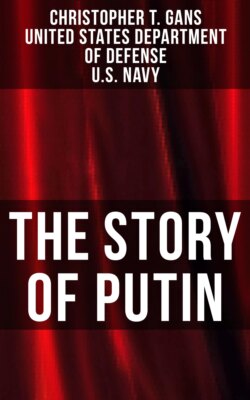Читать книгу The Story of Putin - United States Department of Defense - Страница 20
На сайте Литреса книга снята с продажи.
a. NATO
ОглавлениеTable of Contents
Vladimir Putin has never hidden his general disdain for Cold War era security institutions, especially the North Atlantic Treaty Organization, which was organized as a counter to Stalinist Soviet aggression. Vladimir Putin has continually affirmed that NATO’s time of relevance should have died when the Red Flag came down over the Kremlin. The institution’s continued existence, therefore, remains a root of contention between Russia and the West, especially the United States, given the observation that America remains the dominant motivator within NATO. Though not officially an antagonist to Russia, the dominant Soviet successor state, NATO’s declared positions and actions during the decade immediately after the end of the Cold War helped exacerbated Putin’s and Russia’s apprehensions, apprehensions which also stem from a Cold War/KGB cognitive predisposition as discussed previously.
The 1990s would proceed and result in a legacy of tension and downright slighting of Russia at the hands of NATO. Perceived snubbing of Russia did not help in calming tensions. NATO routinely voiced support for NATO-Russian cooperation and coordination under Yeltsin, but equally consistently negated any Russian moves for true equal-partner status in settling issues pertinent to both parties. With the signing of the Founding Act in 1997 between NATO and then Russian President Yeltsin, Russian participation in NATO decision making through the new Permanent Joint Council failed to live up to the expectations many had envisioned. Though Russia had been granted a seat at the table, that table was not always in the same room where the substantive discussions were occurring. The Russian delegation to NATO, though granted ambassadorial status, was not allowed to reside at NATO headquarters, nor given universal access to NATO meetings, nor vote or veto any NATO decision making.1 A senior State Department official summed up the PJC relationship well: “…the PJC is a consultative mechanism…It does not mean a situation in which you are obliged to negotiate.”2 With America, the dominant NATO member, allegedly dismissing the PJC as a venue only for semantic exercise and Russia denied any real power within it, this first attempt at improved NATO-Russian relations could, therefore, be easily witnessed as an affront by NATO and the United States against Russia.
Intertwined within the issue of prospective NATO-Russian partnership were tensions over the proposed expansion of NATO into Central and Eastern Europe. In the fledgling years of Yeltsin’s Russia, a pleasant relationship developed between the new Russian president and U.S. President Clinton. Yeltsin, rightly or wrongly, interpreted signals from the Clinton Administration in 1993 that implied an American willingness to accede to Russian involvement in Russia’s “near abroad” just like U.S. hegemony in the Western Hemisphere. America allegedly granted the Russian Federation a sphere of influence within the former Soviet space. Such an unofficial agreement between the two leaders, with Yeltsin easing his opposition to NATO expansion in exchange for America’s, and thereby NATO’s, acceptance of Russian designs in Eurasia failed to materialize. By 1995, the United States had reverted from a conciliatory Russian foreign policy and called for NATO expansion regardless of Yeltsin’s protests.3 NATO and the United States had snubbed Russia and Yeltsin over the issue of NATO expansion once, only to be repeated again. The Russian government, under Yeltsin, tacitly acquiesced to NATO’s expansion plans into Eastern and Central Europe in 1997 in exchange for what they hoped and assumed would be a seat at the table in the form of the PJC as discussed above. The envisioned partnership for Russia, however, failed to come to true fruition, while NATO’s desired membership boom proceeded after the Madrid Summit of that same year with Poland, Czechoslovakia, and Hungary all joining the alliance.4 Russia had been slighted yet again over the issue of NATO expansion.
Hard liners in Russia found their fears vindicated when some U.S. Cold Warriors, like Henry Kissinger, asserted that NATO enlargement during the 1990s should proceed quickly not to hasten democratic development in Europe or prepare for totalitarian resurgence in Russia, but rather exploit Russia’s weaknesses and gain a supreme geostrategic position on the continent.5 Anti-NATO Russians, like Putin, could thereby claim that NATO enlargement had been and will continue to be an affront against Russia, to threaten the Federation just like it had done to the Soviet Union.
1 Mark Weber, James Sperling, and Martin Smith, NATO’s Post-Cold War Trajectory: Decline or Regeneration? (New York: Palgrave Macmillan, 2012), 129.
2 Ibid., 130.
3 Ibid., 127.
4 Ibid., 128, 130.
5 Raymond Garthoff, "NATO and Russia," The Brookings Review 15, no. 2 (Spring 1997): 10.
